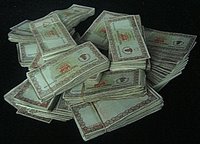 I believe that every event, every meeting, every moment of life is an opportunity to learn. Even though first impressions of people, situations and events may lead one to assume that this is otherwise, a small gesture of openness is often all that is required. I confess that on arrival at the slightly run down DOC camp in the back blocks of Taranaki, I had to tell myself "there is something to learn here" and with that throw myself into conversations - that I am happy to report revealed a circle of dedicated people who had lots to teach me.
I believe that every event, every meeting, every moment of life is an opportunity to learn. Even though first impressions of people, situations and events may lead one to assume that this is otherwise, a small gesture of openness is often all that is required. I confess that on arrival at the slightly run down DOC camp in the back blocks of Taranaki, I had to tell myself "there is something to learn here" and with that throw myself into conversations - that I am happy to report revealed a circle of dedicated people who had lots to teach me.The LETS movement in New Zealand has had its moments of growth and decline - often in synch with the relative buoyancy of the market economy in which we find ourselves functioning. When people are "down on their luck" they will often turn to the complimentary currencies and find them to be a useful means of managing exchanges of goods and services which they might otherwise not be able to access, due to a lack of cash. Unfortunately if people are not educated in the realities of the market economy and how that economy undermines the social and environmental capital of their community, they will often turn their back on this tool when the market becomes buoyant again.
But the people at this annual LETS conference are the troopers. These are the ones who are working to maintain and constantly improve the functioning of the complimentary currencies that we New Zealanders can plug into and take advantage of. They are always available to welcome new members and educate them into the benefits of using a currency which does not support the upward flow of wealth from the broad lower levels of society to the small numbers of ever more wealthy elite.
I wish this subject were easier to write about. But it's not. And part of the problem is the incredible level of mis-information which we have been bombarded with, since birth. The serious study of money is something few of us dare to tackle. It has been made to appear so complicated, and beyond our comprehension. Better that we just get up each day and go off to work, to earn enough of the stuff to pay for the food, clothes, shelter and other needs which seem to cost us more and more each day. We don't really have the time to delve into this, even if we imagined that a) we could come to some significant degree of understanding of the subject, or b) have any influence on changing it if we found it to be lacking in any way.
I will write more on this subject soon (as soon as I can figure out how to simplify this subject for you). In the meantime I will leave you with these questions to prompt your thinking - till we meet again:
- Who prints the money that we use?
- How do they decide how much to print?
- Why does the value of our money constantly reduce (or costs rise)?

No comments:
Post a Comment